五年级英语下册第一单元单词及重点句型汇总
小学五年级英语下册各单元重点词语短语汇总
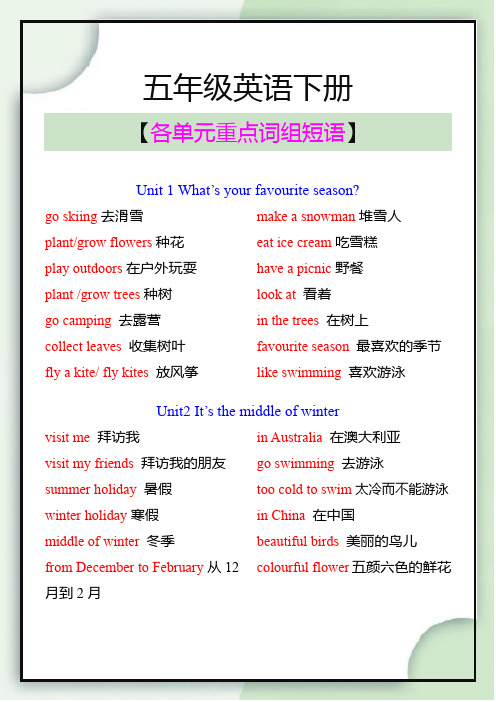
五年级英语下册【各单元重点词组短语】Unit 1 What’s your favourite season?go skiing去滑雪plant/grow flowers种花play outdoors在户外玩耍plant /grow trees种树go camping去露营collect leaves收集树叶fly a kite/ fly kites放风筝make a snowman堆雪人eat ice cream吃雪糕have a picnic野餐look at 看着in the trees 在树上favourite season最喜欢的季节like swimming 喜欢游泳Unit2 It’s the middle of wintervisit me 拜访我visit my friends 拜访我的朋友summer holiday 暑假winter holiday寒假middle of winter冬季from December to February从12月到2月in Australia 在澳大利亚go swimming去游泳too cold to swim太冷而不能游泳in China在中国beautiful birds美丽的鸟儿colourful flower五颜六色的鲜花Unit3 We are going to have an English testsee a film看电影have a party开一个聚会on June 11th在6月11日an English test一次英语考试tomorrow evening 明天晚上visit the museum参观博物馆anything else important其他重要的事情visit a farm参观农场have a sport meeting开校运会the school open day学校开放日New Year’s Day元旦Teachers’ Day 教师节Children’s Day 儿童节Women’s Day 妇女节May Day 劳动节Spring Festival 春节Christmas 圣诞节Mother’s Day 母亲节Tree Planting Day植树节Unit4 Have a good time in Hainanin Hainan在海南on Tuesday 在星期二for five days 持续五天的go for a picnic举行一次野餐all day 整天in the pool 在池里on the beach在海滩上under the stars 在星光下fly back home飞回家at noon在中午mountain climbing爬山have a good time过得愉快Unit 5 Would you like to go with us?plan to do计划去做go on a picnic去野餐at the school gate在学校门口see a film 看电影have a party举行一次聚会watch a football match 观看一场足球赛Unit 6 See you the partyinvite…to… 邀请…去做…call me on打我的电话at 2 p.m. 在下午两点钟at a surprise part在一个令人惊喜的聚会on this special day在这个特殊的日子里at the school meeting room在学校会议室Unit 7 We will go by trainon foot 步行the Great Wall 长城the Summer Palace颐和园take a walk 散步plan for the holiday假期计划go traveling去旅行go by train 乘火车去on October 2nd在10月2日come back home 回家ride a bike 骑自行车go boating 去划船see the picture show 看画展have fun娱乐visit Window of the World 参观世界之窗Unit8 Ben’s first trip to Beijingby plane乘飞机trip to Beijing去北京旅行fly back home 搭乘飞机回家by underground 乘地铁on Friday morning在星期五早上an exciting trip一次激动的旅行drive to the Great Wal l开车去长城in Wangfujing Street在王府井大街take a walk around the lake环湖散步Unit9 Be careful!come on来吧;快点;赶快watch out 注意fall down 跌倒in trouble 遇到麻烦the hot water 热水get sick 生病be careful 小心cut yourself 割伤你自己climb a tree 爬树eat a bad apple吃一个坏苹果touch a fan 摸风扇feed the animals喂动物get hurt 受伤help each other 互相帮助Unit 10 How to stay safecross the street过马路climb tall trees爬很高的树in the street在大街上during school hours在学校期间at the traffic lights在交通灯区on the stairs在楼梯上from strangers从陌生人那里safety crossing安全的路口take money拿钱safety first安全第一Stay safe保持安全Unit 11Can you tell me the wayover there 在那边the way to 去…的路turn right向右转turn left向左转at the second crossing在第二个十字路口on the left在左边on the right在右边next to the school 在学校的隔壁Excuse me. 劳驾;请原谅post office邮局You’re welcome.不客气We’re lost. 我们迷路go straight ahead直走train station 火车站police station警察局Unit 12 I know a shirt cutshort cut 捷径on time 及时;按时in front of 在…前面in ten minutes在十分钟内get there到达那里get to the cinema到达电影院out of their house从他们的房子走出来take the first right在第一个路口右转start to walk quickly开始赶快a different way一条不同的路the main street 大街主干walk through the park走路穿过公园。
五年级下册第一单元英语笔记必考
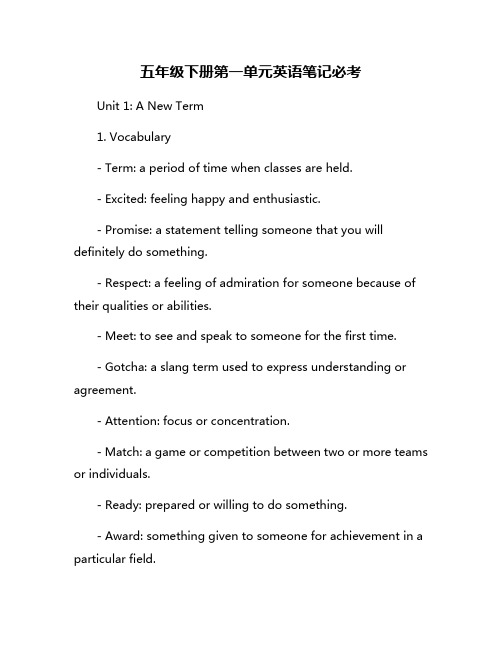
五年级下册第一单元英语笔记必考Unit 1: A New Term1. Vocabulary- Term: a period of time when classes are held.- Excited: feeling happy and enthusiastic.- Promise: a statement telling someone that you will definitely do something.- Respect: a feeling of admiration for someone because of their qualities or abilities.- Meet: to see and speak to someone for the first time.- Gotcha: a slang term used to express understanding or agreement.- Attention: focus or concentration.- Match: a game or competition between two or more teams or individuals.- Ready: prepared or willing to do something.- Award: something given to someone for achievement in a particular field.- Fantastic: very good or impressive.2. Grammar- Present simple tense: used to talk about habits, routines, and facts.E.g. He goes to school every day.- Present continuous tense: used to talk about actions happening at the moment of speaking.E.g. She is reading a book.- Future structures: will + base verb, going to + base verb, present continuous tense.E.g. I will meet you after school.- Comparative adjectives: used to compare two things.E.g. My notebook is bigger than yours.- Superlative adjectives: used to compare three or more things.E.g. She is the tallest girl in the class.3. Speaking Practice- Role-play: students can pretend to be characters in a dialogue and practice speaking.E.g. A: Hi, I'm Anna, what's your name?B: Hello Anna, I'm Jack.- Dialogues: students can read and practice dialogues with a partner to improve speaking skills.E.g. Teacher: What's your favorite subject?Student: My favorite subject is Math.4. Writing Practice- Keep a diary: students can write about their daily activities, thoughts, and feelings in a diary.E.g. Today I had a math test and I did my best.- Write a letter: students can practice writing formal or informal letters to friends, family, or pen pals.E.g. Dear Grandma, I hope you are doing well. I miss you a lot.5. Listening Practice- Listen to songs: students can listen to English songs and try to understand the lyrics.E.g. "We Will Rock You" by Queen.- Listen to podcasts: students can listen to podcasts in English about different topics to improve listening skills.E.g. TED Talks on science and technology.Overall, this unit focuses on vocabulary, grammar, speaking, writing, and listening practice to help students improve their English skills and prepare for the upcoming term. By studying and practicing these key concepts, students will be able to confidently communicate in English and succeed in their academic endeavors. Good luck!。
五年级下册英语书第一单元单词重点句子
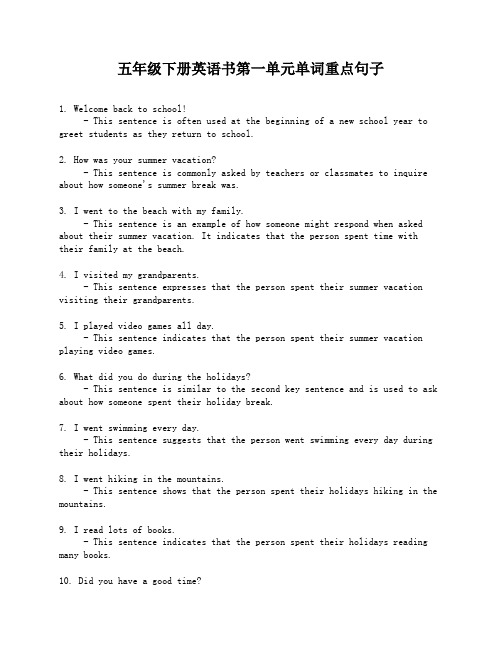
五年级下册英语书第一单元单词重点句子1. Welcome back to school!- This sentence is often used at the beginning of a new school year to greet students as they return to school.2. How was your summer vacation?- This sentence is commonly asked by teachers or classmates to inquire about how someone's summer break was.3. I went to the beach with my family.- This sentence is an example of how someone might respond when asked about their summer vacation. It indicates that the person spent time with their family at the beach.4. I visited my grandparents.- This sentence expresses that the person spent their summer vacation visiting their grandparents.5. I played video games all day.- This sentence indicates that the person spent their summer vacation playing video games.6. What did you do during the holidays?- This sentence is similar to the second key sentence and is used to ask about how someone spent their holiday break.7. I went swimming every day.- This sentence suggests that the person went swimming every day during their holidays.8. I went hiking in the mountains.- This sentence shows that the person spent their holidays hiking in the mountains.9. I read lots of books.- This sentence indicates that the person spent their holidays reading many books.10. Did you have a good time?- This sentence is commonly asked after someone shares about their holiday activities or experiences. It is used to inquire if they enjoyed their time.11. Yes, I had a great time!- This sentence is a positive response to the previous question, indicating that the person indeed had a wonderful time.12. No, it was boring.- This sentence is a negative response to the previous question, suggesting that the person did not enjoy their holiday break.13. Did you see any interesting places?- This sentence is asked when inquiring if someone visited any unique or intriguing locations during their holidays.14. Yes, I visited a famous museum.- This sentence shows that the person went to a well-known museum during their holidays.15. No, I stayed at home the whole time.- This sentence indicates that the person did not go anywhere and instead remained at home throughout their holidays.16. How about you?- This sentence is often used as a follow-up question to ask the other person about their holiday experiences.17. I had a fantastic summer vacation!- This sentence expresses that the person had an amazing summer vacation.18. I made many new friends.- This sentence suggests that the person was able to form numerous new friendships during their vacation period.19. I learned how to play the piano.- This sentence indicates that the person acquired the skill of playing the piano during their summer break.20. I tried new foods.- This sentence shows that the person experimented with different types of food during their holidays.21. We took a road trip to another city.- This sentence indicates that the person went on a road trip to a different city during their holidays.22. I participated in a summer camp.- This sentence suggests that the person attended a summer camp during their vacation period.23. I volunteered at a local animal shelter.- This sentence indicates that the person spent their holidays volunteering at a local animal shelter.24. I attended a music festival.- This sentence shows that the person went to a music festival during their holidays.25. I improved my language skills.- This sentence suggests that the person worked on improving their language skills during their vacation.26. Did you travel anywhere exciting?- This sentence is asked when inquiring if someone went on anythrilling or exciting trips during their holidays.27. Yes, I went on a safari in Africa.- This sentence indicates that the person went on a safari in Africa during their holidays.28. No, I prefer staying close to home.- This sentence shows that the person prefers to stay near their home during the holiday period.29. What was your favorite part of the vacation?- This sentence is asked to find out which part of the holiday was the most enjoyable for someone.30. My favorite part was trying out new water sports.- This sentence suggests that the person's favorite part of their vacation was trying new water sports.31. I enjoyed spending quality time with my family.- This sentence indicates that the person cherished the moments spent with their family during their holidays.32. I can't wait to hear about your adventures!- This sentence expresses excitement and eagerness to listen to someone else's holiday experiences and adventures.33. I had a chance to unwind and relax.- This sentence suggests that the person had an opportunity to relax and unwind during their vacation.34. I caught up on my sleep.- This sentence indicates that the person was able to get enough rest and catch up on their sleep during their holidays.35. I spent time bonding with my siblings.- This sentence shows that the person used their vacation to strengthen their relationship and bond with their siblings.。
(完整版)人教版五年级英语下册Unit1知识点汇总

Unit1 My day 知识整理△话题:谈论每天的活动及时间安排△词汇:do morning exercises(做早操)eat breakfast/lunch/dinner(吃早餐/午餐/晚餐)have...class(上…课),play sports(做运动)clean my room(打扫我的房间),go for a walk (散步) go shopping(购物),take a dancing class(上舞蹈课)△拓展词汇:get up(起床), go to bed(上床睡觉)wash my clothes(洗我的衣服), watch TV(看电视)do homework(做作业), play music(演奏音乐)cook dinner(煮晚餐), at home(在家)in the morning(在上午),in the afternoon(在下午)in the evening(在晚上),at night(在半夜)△句型:①询问做某事在几点When do you+动词原形(短语)+其他?—— At +时间—— I(+频度副词)+动词原形(短语)+at+时间。
例句:When do you get up in the morning?—— At 7:30.—— I often get up at 7:30.②询问周末的活动安排What do you often do on the weekend?I often (always/sometime/usually) +…(周末的活动)+with … (某人)+on the weekend (on Saturdays/on Sundays ).例句:What do you do on the weekend ?I often take a dancing class with my friend on Sundays. △知识点:1:注意介词的搭配at +具体时间(几点)/night/home at 9 o ’clock in +国家/季节 in Spainon +星期 on the weekend/on Sundays with +人 with my father/mother/friend 2:表示时间频率词的区别always 表示总是,一直;usually 表示经常,通常;often 表示经常,常常;sometimes 表示有时,间或。
英语五年级下册笔记

英语五年级下册笔记一、单词部分。
1. Unit 1.- 四会单词(要求会听、说、读、写)- do morning exercises(做早操):这是一个动词短语,“do”在这里表示“做”,“morning exercises”是“早操”的意思。
- eat breakfast(吃早饭):“eat”是“吃”,“breakfast”是“早餐”。
- have…class(上……课):例如“have English class(上英语课)”,“have”在这里表示“进行、从事”。
- play sports(进行体育运动):“play”有“玩、参加(比赛或运动)”的意思,“sports”是“体育运动”的复数形式。
- eat dinner(吃晚饭):和“eat breakfast”结构相同,“dinner”指“晚餐”。
- 三会单词(要求会听、说、读)- usually(通常;一般):是一个频度副词,用来描述事情发生的频率。
- Spain(西班牙):国家名称,首字母要大写。
- late(晚;迟):例如“be late for(迟到)”。
2. Unit 2.- 四会单词。
- spring(春天):季节名称,还可以表示“泉水”“跳跃”等其他意思,但在本单元表示季节。
- summer(夏天):注意其发音,字母“u”发/ʌ/音。
- autumn(秋天):也可以说“fall”,尤其在美国英语中。
- winter(冬天):这四个季节单词是描述天气和季节相关话题的基础词汇。
- season(季节):是一个可数名词,复数形式是“seasons”。
- 三会单词。
- picnic(野餐):常和“have a picnic(去野餐)”搭配使用。
- go on a picnic(去野餐):这是一个常用短语。
- pick(摘;采集):例如“pick apples(摘苹果)”。
- pick up(捡起;拾起):有不同的含义,在这里是“捡起”的意思。
五年级英语第一单元知识点
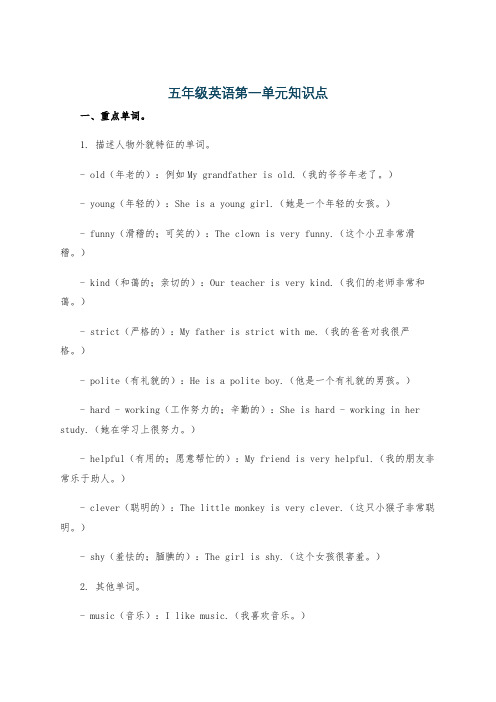
五年级英语第一单元知识点一、重点单词。
1. 描述人物外貌特征的单词。
- old(年老的):例如My grandfather is old.(我的爷爷年老了。
)- young(年轻的):She is a young girl.(她是一个年轻的女孩。
)- funny(滑稽的;可笑的):The clown is very funny.(这个小丑非常滑稽。
)- kind(和蔼的;亲切的):Our teacher is very kind.(我们的老师非常和蔼。
)- strict(严格的):My father is strict with me.(我的爸爸对我很严格。
)- polite(有礼貌的):He is a polite boy.(他是一个有礼貌的男孩。
)- hard - working(工作努力的;辛勤的):She is hard - working in her study.(她在学习上很努力。
)- helpful(有用的;愿意帮忙的):My friend is very helpful.(我的朋友非常乐于助人。
)- clever(聪明的):The little monkey is very clever.(这只小猴子非常聪明。
)- shy(羞怯的;腼腆的):The girl is shy.(这个女孩很害羞。
)2. 其他单词。
- music(音乐):I like music.(我喜欢音乐。
)- art(美术):We have art class today.(我们今天有美术课。
)- science(科学):Science is very interesting.(科学非常有趣。
)- English(英语):I study English every day.(我每天学习英语。
)- maths(数学):Maths is not easy for me.(数学对我来说不容易。
)- Chinese(语文;汉语):We learn Chinese in school.(我们在学校学习语文。
小学五年级下册英语单词及句型【五篇】
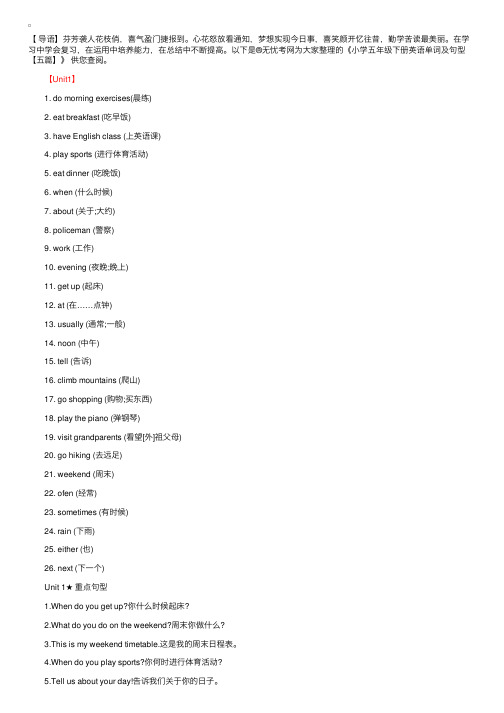
【导语】芬芳袭⼈花枝俏,喜⽓盈门捷报到。
⼼花怒放看通知,梦想实现今⽇事,喜笑颜开忆往昔,勤学苦读最美丽。
在学习中学会复习,在运⽤中培养能⼒,在总结中不断提⾼。
以下是®⽆忧考⽹为⼤家整理的《⼩学五年级下册英语单词及句型【五篇】》供您查阅。
【Unit1】1. do morning exercises(晨练) 2. eat breakfast (吃早饭) 3. have English class (上英语课) 4. play sports (进⾏体育活动) 5. eat dinner (吃晚饭) 6. when (什么时候) 7. about (关于;⼤约) 8. policeman (警察) 9. work (⼯作) 10. evening (夜晚;晚上) 11. get up (起床) 12. at (在……点钟) 13. usually (通常;⼀般) 14. noon (中午) 15. tell (告诉) 16. climb mountains (爬⼭) 17. go shopping (购物;买东西) 18. play the piano (弹钢琴) 19. visit grandparents (看望[外]祖⽗母) 20. go hiking (去远⾜) 21. weekend (周末) 22. ofen (经常) 23. sometimes (有时候) 24. rain (下⾬) 25. either (也) 26. next (下⼀个) Unit 1★重点句型 1.When do you get up?你什么时候起床? 2.What do you do on the weekend?周末你做什么? 3.This is my weekend timetable.这是我的周末⽇程表。
4.When do you play sports?你何时进⾏体育活动? 5.Tell us about your day!告诉我们关于你的⽇⼦。
【口袋书】人教版PEP五年级下册英语 基础知识汇总

人教版PEP五年级下册基础知识汇总Unit 1 My day.重点单词:[四会]dancing 跳舞;舞蹈exercise 活动;运动take 学习;上(课)[三会]after 在(时间)后start 开始usually 通常地;惯常地Spain 西班牙late 晚;迟a.m.午前;上午p.m.午后;下午why 为什么shop 去买东西;购物work 工作last 上一个的;刚过去的sound 听起来好像also 还;也busy 忙的need 需要play 戏剧;剧本letter 信live 居住island 岛always 总是;一直cave 山洞;洞穴win 获胜重点短语:eat breakfast 吃早饭have … class 上…课play sports 进行体育运动do morning exercises 做早操eat dinner 吃晚饭clean my room 打扫我的房间go for a walk 散步go shopping 去买东西;购物take a dancing class 上舞蹈课go swimming 去游泳start class 开始上课last night 昨天晚上after lunch 午饭以后a lot of fun 许多乐趣live on an island 住在一座岛上be good at sports 擅长体育运动字母组合cl 发/kl/ 音:clean 打扫clock 钟class 课;班级clever 聪明的clock 钟字母组合pl 发/pl/ 音:plate 盘子;碟子eggplant 茄子please 请play 玩耍;戏剧重点句型:1.询问别人什么时候做某事的问句及回答:-- When do/does + 主语+ 动词(短语)原形(+ 其他)?-- 主语(+ 频度副词)+ 动词(短语)原形/ 第三人稀单数形式+ at + 具体时间/ At + 具体时间.-- When do you get up? 你什么时候起床?-- I get up at 5 o'clock. 我5点起床。
- 1、下载文档前请自行甄别文档内容的完整性,平台不提供额外的编辑、内容补充、找答案等附加服务。
- 2、"仅部分预览"的文档,不可在线预览部分如存在完整性等问题,可反馈申请退款(可完整预览的文档不适用该条件!)。
- 3、如文档侵犯您的权益,请联系客服反馈,我们会尽快为您处理(人工客服工作时间:9:00-18:30)。
五年级英语下册第一单元单词及重点句
型汇总
Unit1rdList单词表
leanr(打扫我的房间)
drningexerises(晨练)
gfraal
(散步)
eatbreafast(吃早饭)
taeadaninglass(上舞蹈)
gshpping(购物;买东西)
haveEnglishlass(上英语)
eatdinner(吃晚饭)
plasprts(进行体育运动)
hen(什么时候)
evening(夜晚;晚上)
getup(起床)
at(在……点钟)
eeend(周末)
alas(总是,一直)
ften(经常)
seties(有时候)
usuall(通常;一般)
Unit1ainsentenes主要句型
hendugetup?(你什么时候起床?)
---Iftengetupat7’l(我经常在7点钟起床。
)
2hendustartlassinSpain?(你在西班牙什么时候开始上?)
---Usuallat9’l(通常在9点钟。
)
3hatdudntheeeend?(你在周末做什么?)
---IftenathTVandplaping-pngithfather(我经常看电视,也常和我爸爸打乒乓球。
)
4IusuallashlthesSetiesIdinner(我经常洗衣服。
有时候我会做晚餐。
)
Thatsundsliealtffun(那样听起来很有趣。
)
Unit1da
一、根据所给中文意思写单词。
__________________
__________________
__________________(打扫我的房间)
(散步)
(吃晚饭)
__________________
__________________
__________________(上舞蹈)
(上英语)
(购物;买东西)
__________________
__________________
__________________
(吃早饭)
(进行体育运动)
(晨练)
二、根据问句写答句。
hendugetup?
___________________________________________(我经常在7点钟起床。
)2hatdudntheeeend?
___________________________________________我经常看电视,也常和我爸爸打乒乓球。
)
3hendustartlassinSpain?
___________________________________________(通常在9点钟。
)
三、连词成句。
lt,sunds,a,f,fun,that,lie()
___________________________________________________ __
2ash,I,seties,lthes,,I,usuall,dinner()
()
___________________________________________________ __。
